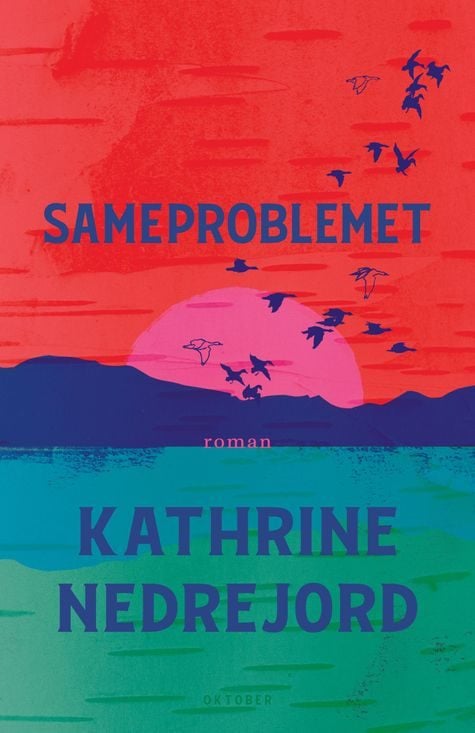“Nedrejord writes brilliantly… Nedrejord skillfully connects several generations’ experiences with racism to a single life event… Nedrejord is a master at depicting the dynamics between perpetrator and victim, and The Sami Problem exposes all these nuances in a virtuoso manner.”
6/6 stars, Oda Faremo Lindholm, VG
“Fearless and furious. Kathrine Nedrejord’s new novel is a Sami indictment against the Norwegian majority society’s oppression, invisibility, mockery, and racism… Marie Engmo’s narrative voice is sometimes subdued, but just as often intense and furious… With this novel, Kathrine Nedrejord once again demonstrates her insistent will to analyze the difficult issues surrounding victim and perpetrator. She convinces, both in language and temperament.”
6/6 stars , Inger Bentzrud, Dagbladet
“Powerful … Kathrine Nedrejord puts her finger on a wound and presses so hard that the reader becomes both horrified and wiser. Nedrejord is also a fearless author… The middle part stands out with a dazzling exposition of Sami identity”
Ingunn Økland, Aftenposten
“With The Sami Problem Nedrejord superbly places herself in an international tier of non-fiction-oriented novels … What elevates The Sami Problem as a novel is the author’s exploration of Sami identity and the pitfalls of trying to portray Sami identity comprehensively and credibly … Traditionally, stories from indigenous peoples often have vivid nature descriptions that closely tie the characters to natural areas and nature-mythical origin images. Nedrejord protests against the way Sami origin is usually conveyed … Nedrejord convincingly integrates a political level with personal experience when she weaves all the discrimination Marie has been subjected to into a coming-of-age story … Only an author like Nedrejord can make complex insights so accessible that most people can grasp them. The Sami Problem should be read by everyone.”
Astrid Fosvold, Vårt Land
“Nedrejord’s new novel forces the reader to examine themselves … The book examines from a Sami perspective how it feels to be seen as a problem in Norway, here and now – and over several hundred years … The text is strongest when it delves into areas that only a novel can explore in depth and breadth, where the societal and personal meet, in áhkkus and Marie’s lives as varying physical and psychological pain over being defined as Sami, or worse, as ‘mountain Finn’ or ‘Finn bastard.’”
Tom Egil Hverven, Klassekampen
“Nedrejord is both clear-headed and analytical, and fiercely angry in her new novel, which manages to both inform and entertain… It is almost impossible not to think of Simone de Beauvoir and her work on ‘the other,’ the groundbreaking The Second Sex, while reading Kathrine Nedrejord… In this sense, The Sami Problem can also be characterized as a philosophical-existential work. But unlike de Beauvoir, the author has managed to dress her outraged anger in literary garments… This reviewer has rarely read a more eye-opening and harsh account of the Sami’s life in Norway… Striking and often deadly accurate characterizations abound in this extremely well-formulated novel… Norway is not homogeneous, she writes. We exist, and we are different. Thus, she unleashes her literary powers and delivers a well-aimed punch”
Turid Larsen, Dagsavisen
“Kathrine Nedrejord’s novel of the year is politically intelligent, knowledgeable, and touches on the entire spectrum of human emotions. This makes for good literature.”
Marjam Idriss, Vinduet
“Finally, the novel that lets me understand what the Sami have been carrying… I realize that I have missed a novel like this… I look forward to discussing the book throughout the autumn”
Siss Vik, Literary newsletter, NRK
“The Sami Problem is sprawling, yet assertive. Thus, the novel challenges Scandinavian assumptions about what literature is… Perhaps because the book mimics the spontaneous storytelling tradition of the family, which differs from the formula-based conversation of southerners, it is never afraid to appear bombastic… The willingness to examine the individual in light of larger societal changes is familiar to Norwegian readers from the books of Édouard Louis and Annie Ernaux. But where the latter maintains a cool sobriety even when the novel is written in the first person, Nedrejord’s first-person narrative is primarily powerful. The probing into feelings of alienation and fear of violence is painful. The depictions undoubtedly have transferable value to other minorities.”
Maria Olerud, Morgenbladet

